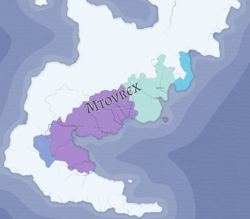Yrkyr
| Yrkyr language | |
|---|---|
| Jyrkyr | |
 | |
| Pronunciation | [/ˈjər.kər/] |
| Created by | Raistas |
| Setting | planet Morev |
| Ethnicity | Jyrwutyr |
| Native speakers | 70 000 (271 local year) |
Yrharian
| |
Early forms | Proto-Yrharian
|
Yrkyr (Yr: jyrkyr /ˈjər.kər/, or jyrharkyr /jər.ˈhɑr.kər/) is a North Yrharian language, spoken in the northeastern part of Mtovrex (Turix/tʷu.ˈrʲix/) in the Irgva continent (Kynon /kə.ˈnʌn/). The name of the language means "the speech of the local people". The other living Yrharian language is Yhkagur /jə.ʰka.ɣʷur/ spoken further north between the White Mountains and the Shallow Sea, which is unintelligible to Yrkyr. Both languages evolved from a common ancestor approximately 2 000 years ago and still remain in contact, allowing new words entering easily. Yrkyr also underwent a slight Mtari influence by the contact with the Mtari people. It is reflected by the presence of many Mtari loanwords in its vocabulary, however they were adapted to the Yrkyr phonology and thus may be almost completely unrecognizable to a Mtari speaker.
The Yrkyr language has approximately 70 thousand native speakers, most of whom are monolingual and illiterate. Some also learned Mtari due to the modern compulsory education policy, which requires children to get a basic education in boarding schools.
Phonology
Consonants
Like other Yrharian languages, Yrkyr lacks a voiceless/voiced distinction in consonants, which is present in Mtari and thus makes a noticeable accent in Yrharians trying to speak it. Consonant clusters are not allowed word-intially and finally in native words, and only two consonants are allowed together medially, creating a steady rhythm while speaking the language. This rule is also applied to loanwords from Mtari, which allows long consonant clusters. Even the name of the language is Tari in Yrkyr. Syllables ending in a consonant are considered heavy and usually receive a stress, which is otherwise unpredictable.
| Bilabial | Dental | Post-alveolar | Velar | Glottal | |||
|---|---|---|---|---|---|---|---|
| central | lateral | plain | labialized | ||||
| Nasal | m | n | ŋ | ŋʷ | |||
| Plosive | p | t | k | kʷ | |||
| Affricate | t͡s | t͡ʃ | t͡ɬ[note 1] | ||||
| Fricative | s | ʃ | (ɬ)[note 2] | x | xʷ | h (ɦ)[note 3] | |
| Approximant | l | j | w | ||||
| Trill | r | ||||||
Palatalization and labialization are two unique Yrharian features. In Proto-Yrharian almost every consonant had a palatalized and a labialized variants. But a sound change, that resulted in lowering of North Yrharian high vowels, allowed to eliminate them as phonemic everywhere, except for velars, which still preserve labialized counterparts. In modern language both palatalization and labialization occure before /i/ and /u/ respectively, but these features are not phonemic anymore. Instead new consonant alterations derived from the change.
Vowels
| Front | Central | Back | |||
|---|---|---|---|---|---|
| long | short | long | short | ||
| Close | iː | i | uː | u | |
| Mid | ə | ||||
| Open-mid | ɛː | ɛ | ʌː | ʌ | |
| Open | aː | ɑ | |||
There are five vowels, four of which contrast in length. The quality of long vowels mostly overlaps with the quality of short vowels, except long ones are pronounced slightly more closed, while short vowels are slightly centralized. The only exception is /aː/ which is fronted noticeably comparing to its short counterpart. Long vowels are denoted with a silent "h" before consonants in the orthography, since the consonant /h/ appeares in this environment, while conjugating various words. In Yrhu the final "h" is pronounced as a weak aspiration, but it is still silent before other consonants, lengthening a preceding vowel.
Yrhu
Yrhu (jyrhu /jər.ˈɦu/) is a dialect of Yrkyr spoken next to the Shallow Sea. While being intelligible with Yrkyr to some degree, it differ in vocabulary and grammar from the inland language. It shares some more lexical similarity with Yhkagur, while phonologically it is almost identical to Yrkyr.